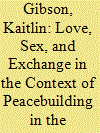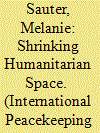| Srl | Item |
| 1 |
ID:
186625


|
|
|
|
|
| Summary/Abstract |
Shortfalls in personnel are common across UN peacekeeping operations (PKOs). An ongoing concern is that many PKOs lack sufficient resources to effectively fulfil their mandates. This may in turn be a major contributing factor to shortages of peacekeepers. How do provisions of non-personnel resources to UN PKOs shape other states’ voluntary commitments of peacekeeping personnel? This study focuses on the role of the U.S.’s voluntary peacekeeping assistance as a mechanism for reducing personnel shortfall. By providing additional assistance for specific peacekeeping operations, the U.S. enhances the ability of states that are willing but lack the resources to deploy peacekeepers and increases the willingness of states that are otherwise reluctant to make personnel commitments to these operations. In turn, these provisions of support lead to greater personnel commitments to the missions where the U.S. allocates this aid. Results from an analysis of U.S. peacekeeping assistance and personnel commitments within UN operations from 2000 to 2015 indicate that these aid provisions lead to reductions in shortfalls of peacekeepers. These findings suggest that the U.S. not only increases collective personnel commitments by providing this additional assistance but, in doing so, may also enhance the effectiveness of the missions it supports.
|
|
|
|
|
|
|
|
|
|
|
|
|
|
|
|
| 2 |
ID:
186626


|
|
|
|
|
| Summary/Abstract |
The narrow framing of Sexual Exploitation and Abuse (SEA) and the United Nations Zero-Tolerance Policy inadequately accounts for the range of sexual interactions in peacekeeping contexts and obscures the wider social contexts within which sexual decision making occurs. We draw on personal narratives from women who have had such sexual interactions, as well as community observers to demonstrate the complexity, multiple forms and ambiguities that characterize these relationships. We focus particularly on ‘love’ and long-term relationships. The complexities revealed cast doubt on the efficacy and appropriateness of the UN’s zero-tolerance policy and call for a modification of the concept of the peacekeeping economy to include consideration of intimacy, emotion and quests to fulfil expectations of gendered social roles in the contradictory landscape of peacekeeping.
|
|
|
|
|
|
|
|
|
|
|
|
|
|
|
|
| 3 |
ID:
186624


|
|
|
|
|
| Summary/Abstract |
While the peacekeeping mission in Mali is the deadliest active mission, aid workers are not a prominent target. This is puzzling because humanitarians argue that integrated missions aligning political, military and humanitarian goals impede their security. I argue that the fallacy of integrated peacekeeping missions is that the humanitarian space shrinks due to rising insecurity. This takes place when integrated missions blur the lines between civilian and military action and when they politicize humanitarian aid through biased mandates. I test the argument by comparing new data on peacekeeping stabilization projects with other aid projects, using a matched wake analysis that estimates a difference-in-difference model with sliding spatio-temporal windows. I find that peacekeeping stabilization activities increase violence against civilians on the ground in the short term, which ultimately decreases humanitarian access. Paradoxically, the UN names lack of humanitarian access as a key challenge to protecting civilians, but contributes to the access challenge itself.
|
|
|
|
|
|
|
|
|
|
|
|
|
|
|
|
| 4 |
ID:
186623


|
|
|
|
|
| Summary/Abstract |
From its capacity for deploying joint operations in conflict zones to its status as a standard-bearing forum for international behaviour, the United Nations has asserted its relevance in a diverse array of issues and conflicts around the world. Equally as diverse has been the scholarship surrounding the United Nations over the past several decades. This collection of essays provides a snapshot of these diverse lines of scholarship, highlighting existing scholarship on a range of topics, as well as identifying areas of opportunity for future scholarly work on these topics. Taken as a whole, this forum more broadly provides insight into core pillars of the United Nations' mission--including the maintenance of peace and security; fostering friendly relations between nations; promoting human rights and humanitarian goals; and encouraging cooperation and harmonization of interests between nations. Moving forward, it is our hope that this collection will serve as a sprigboard for inspiring future work to both build and expand upon the insights from the past several decades of scholarship on the United Nations.
|
|
|
|
|
|
|
|
|
|
|
|
|
|
|
|